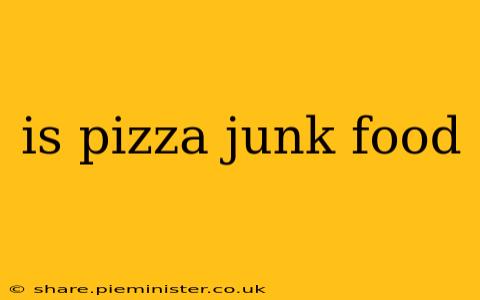Is Pizza Junk Food? A Deep Dive into the Nutritional Landscape
The question of whether pizza is junk food is a complex one, sparking debates among nutritionists and pizza lovers alike. The answer, as with many food classifications, isn't a simple yes or no. It depends heavily on the ingredients, portion size, and frequency of consumption. Let's delve deeper into the nutritional aspects to paint a clearer picture.
What are the ingredients that make some pizzas considered junk food?
Many commercially produced pizzas, especially frozen varieties, often contain high levels of unhealthy ingredients that contribute to its "junk food" label. These include:
- Refined flours: The white flour used in many pizza crusts is low in fiber and nutrients, leading to rapid blood sugar spikes.
- Excessive sodium: Processed pizzas are notorious for their high sodium content, which can contribute to high blood pressure and other health issues.
- Unhealthy fats: Many pizzas rely on saturated and trans fats from processed meats and cheese, increasing cholesterol levels.
- Processed meats: Pepperoni, sausage, and other processed meats often contain high levels of sodium, saturated fat, and preservatives.
- Sugary sauces: Some pizza sauces contain added sugars that boost calorie count and provide minimal nutritional value.
Is all pizza junk food?
No, not all pizza is junk food. Homemade pizzas, particularly those made with whole-wheat crusts, fresh vegetables, lean proteins, and moderate amounts of cheese, can be a part of a balanced diet. The key lies in mindful ingredient selection.
What makes a healthy pizza?
A healthy pizza prioritizes wholesome ingredients:
- Whole-wheat crust: Provides fiber, promoting digestive health and satiety.
- Lean protein: Opt for grilled chicken, turkey, or even chickpeas for a protein boost.
- Abundant vegetables: Load up on colorful vegetables like bell peppers, onions, mushrooms, spinach, and tomatoes for vitamins, minerals, and antioxidants.
- Reduced-fat cheese: Choose part-skim mozzarella or other lower-fat cheese options to minimize saturated fat intake.
- Homemade sauce: Make your own sauce with fresh tomatoes and herbs to control sodium and sugar levels.
How often can I eat pizza and still maintain a healthy diet?
The frequency with which you can enjoy pizza depends largely on your overall dietary habits and calorie goals. While a homemade, healthy pizza can occasionally fit into a balanced diet, relying on pizza as a regular meal may lead to nutrient deficiencies and weight gain. Moderation is key. Consider it a treat rather than a staple.
What are some healthier pizza alternatives?
If you're aiming for a healthier option and crave the pizza experience, consider these alternatives:
- Flatbreads: Utilize whole-wheat flatbreads as a base for your toppings.
- Veggie-packed pizzas: Maximize the vegetable content to increase the nutritional value.
- Cauliflower crust pizza: A lower-carb alternative, but ensure it's made without excessive added ingredients.
Is pizza bad for weight loss?
Pizza's impact on weight loss depends entirely on the ingredients and portion size. A high-calorie, unhealthy pizza will hinder weight loss efforts, while a carefully constructed, portion-controlled healthy pizza can be incorporated into a balanced weight-loss plan.
In conclusion, whether pizza is junk food depends entirely on its composition. By making informed choices about ingredients and mindful of portion sizes, you can enjoy pizza without compromising your health. Prioritize whole foods, lean proteins, and plenty of vegetables to transform pizza from a potential health hazard into a delicious and occasionally healthy meal.
